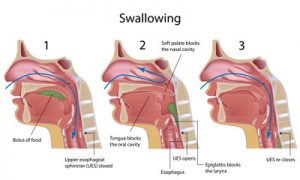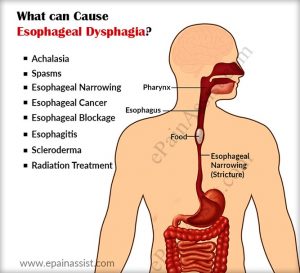CALL TODAY 646-846-1136 | EMAIL
Dysphagia Surgery: Steps, Benefits, Side-Effects, Precautions & Prognosis
Dysphagia Surgery
 Some functional and anatomical abnormalities of the esophagus or the pharynx can cause dysphagia which is essentially a fancy medical term to indicate difficulty swallowing. This condition can be successfully treated by surgical procedures. Also, surgery is recommended when dysphagia is found to be associated with esophageal carcinoma, and compression of this organ due to other abnormalities or tumors in the chest. The surgical methods presently available are varied, and the choice of medical procedure is decided by the causative condition of dysphagia.
Some functional and anatomical abnormalities of the esophagus or the pharynx can cause dysphagia which is essentially a fancy medical term to indicate difficulty swallowing. This condition can be successfully treated by surgical procedures. Also, surgery is recommended when dysphagia is found to be associated with esophageal carcinoma, and compression of this organ due to other abnormalities or tumors in the chest. The surgical methods presently available are varied, and the choice of medical procedure is decided by the causative condition of dysphagia.
Steps
- The LES or lower esophageal sphincter is dilated in patients with achalasia. The doctor makes the patient swallow a tube having a balloon at its end. It is placed across the LES by means of an X-ray, and then the specialist blows the balloon all on a sudden. The objective is to stretch, rather tear, the sphincter. It can also be useful in treating Schatzki rings and strictures and other anatomical problems associated with
- In esophagomyotomy, the surgeon cuts the LES by making a large incision in the abdomen, or laparoscopically where small punctures are made in the chest or the abdomen of the patient.
Benefits
 For patients with severe dysphagia disorders, it may be necessary to bypass the pharynx entirely and the oral cavity to provide them with enteral nutrition. Surgical alternatives range from IOC or intermittent oroesophageal catheterization to PEG or percutaneous endoscopic gastronomy. Surgery for chronic cases of aspiration may include the following procedures:
For patients with severe dysphagia disorders, it may be necessary to bypass the pharynx entirely and the oral cavity to provide them with enteral nutrition. Surgical alternatives range from IOC or intermittent oroesophageal catheterization to PEG or percutaneous endoscopic gastronomy. Surgery for chronic cases of aspiration may include the following procedures:
- Medialization: It restores subglottic pressure and glottis closure during the swallow.
- Laryngeal suspension: The larynx is made to be rest in a comparatively protected place under the tongue.
- Laryngeal closure: The medical practitioner may perform it to shut the glottis off, and thus, provide ample protection for the airway while sacrificing the quality of phonation.
- Laryngotracheal separation-diversion: It may be opted to separate the alimentary tract from the airway.
Complications
The most commonly occurring complications are bleeding and perforation of cricopharyngeus. Dysphagia is typically reported after undergoing an ACS surgery, i.e., surgery of the anterior cervical spine. Although risk factors associated with dysphagia are published in the journals, they remain controversial to date.
Precautions
- The healthcare professional may prescribe making an alteration in food/liquid texture, temperature, or consistency.
- It is vital to ingest slowly and take smaller bites.
- The caregiver should also strictly adhere to the promoting strategies to ensure increased safety.
- It is crucial for one to maintain an appropriate positioning at the time of eating, and the ideal manner is to consume any liquid or food while holding an upright position, and also the chink being tucked a little at a right angle.
- An individual should continue to maintain the upright position even after finishing one’s meal, and should not make any attempt to alter the present position for a minimum of forty-five minutes post-consumption of the meals.
- If a person is found to be diagnosed with GERD also, then the head of the patient’s bed should be inclined at an angle of forty-five degrees.
- The care provider should always remember not to give an aspiration patient anything to consume a few hours before the bedtime.
- One should use medications that are meant to promote stomach emptying and reduce the reflux.
Prognosis
It is rather impossible for anyone to predict the outlook or prognosis for dysphagia in general, as numerous medical conditions can be held responsible for the symptoms associated with it. The outlook is case-dependent and is decided by the underlying medical issue/s of a patient.
Conclusion
Although dysphagia can appear to be frightening, this condition is not always necessarily chronic. The family physician should be consulted as soon as one starts experiencing any swallowing difficulties or other GERD (Gastroesophageal reflux disease) symptoms. The latter can be effectively treated with prescription drugs to reduce the amount of stomach acid.
Get in touch with us at 212-988-1136 or schedule an appointment to get immediate care and treatment for the condition.
References


I have been with this illness for 21yrs.i did go through surgery 20yrs ago it’s been tough I had to learn to teach myself what I can and cannot eat it has been a battle Iam 63 yrs old and this has been a struggle for me but Iam still here and leaving day by day Iam leaving a normal life